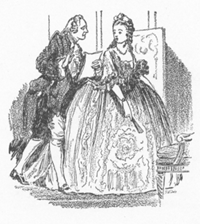|
THE MISANTHROPE was originally
produced in Paris, June 4, 1666, with Molière in the part
of Alceste.
 ALCESTE is one of those candid
souls who believe that the truth should be spoken in season and
out. He will make no concessions to ordinary courtesy and denounces
the insincerity of contemporary society upon every possible occasion.
His friend, Philinte, tries to make him see that honesty does
not require him to go out of his way to offend and hurt people.
He even points out that a few well-spoken words in the right
place might go far toward bringing a favorable decision in the
lawsuit Alceste has pending in the courts. To this Alceste has
but one answer. If his suit cannot win through its own merits,
he will renounce a society which sanctions such injustice and
leave Paris to live the life of a hermit. ALCESTE is one of those candid
souls who believe that the truth should be spoken in season and
out. He will make no concessions to ordinary courtesy and denounces
the insincerity of contemporary society upon every possible occasion.
His friend, Philinte, tries to make him see that honesty does
not require him to go out of his way to offend and hurt people.
He even points out that a few well-spoken words in the right
place might go far toward bringing a favorable decision in the
lawsuit Alceste has pending in the courts. To this Alceste has
but one answer. If his suit cannot win through its own merits,
he will renounce a society which sanctions such injustice and
leave Paris to live the life of a hermit.
When the young courtier, Oronte, begs his opinion on some
verses of which Oronte is the author, Alceste's rude and needless
criticism adds another to the not inconsiderable list of his
enemies and brings upon him the threat of a second lawsuit.
Now Alceste has the misfortune to love Célimène,
a comely and popular young woman with little regard for the truth.
Her main interest is to surround herself with admirers, each
of whom she endeavors to persuade that he is the favored one.
While Alceste is attempting to persuade Célimène
openly to acknowledge their engagement, a pretended friend of
Célimène's, Arsinoé by name, under pretense
of the frankness that Alceste admires, exposes Célimène's
falseness. Her other admirers drop away like flies. Not so Alceste.
His lawsuit has finally been lost, and now he asks Célimène
to prove her love by sharing the hermit's existence to which
he plans to retire.
Célimène is willing to take Alceste's name in
marriage to make up for the injury which she admits she has done
the unquestioned sincerity of his regard. She confesses, however,
that she is unwilling to leave Paris for she has no mind to forego
the pleasures of youth and beauty for anyone's sake. This confession
does for Alceste what Arsinoé's exposure fails to accomplish.
The scales drop from his eyes and he sees Célimène
for the flirt that she is.
Éliante, Célimène's cousin, had herself
been in love with Alceste but since he announces a total lack
of interest in women thenceforward, she contents herself with
the love of his friend, Philinte. The play closes with this couple's
stated determination to change Alceste's outlook on life.
|

